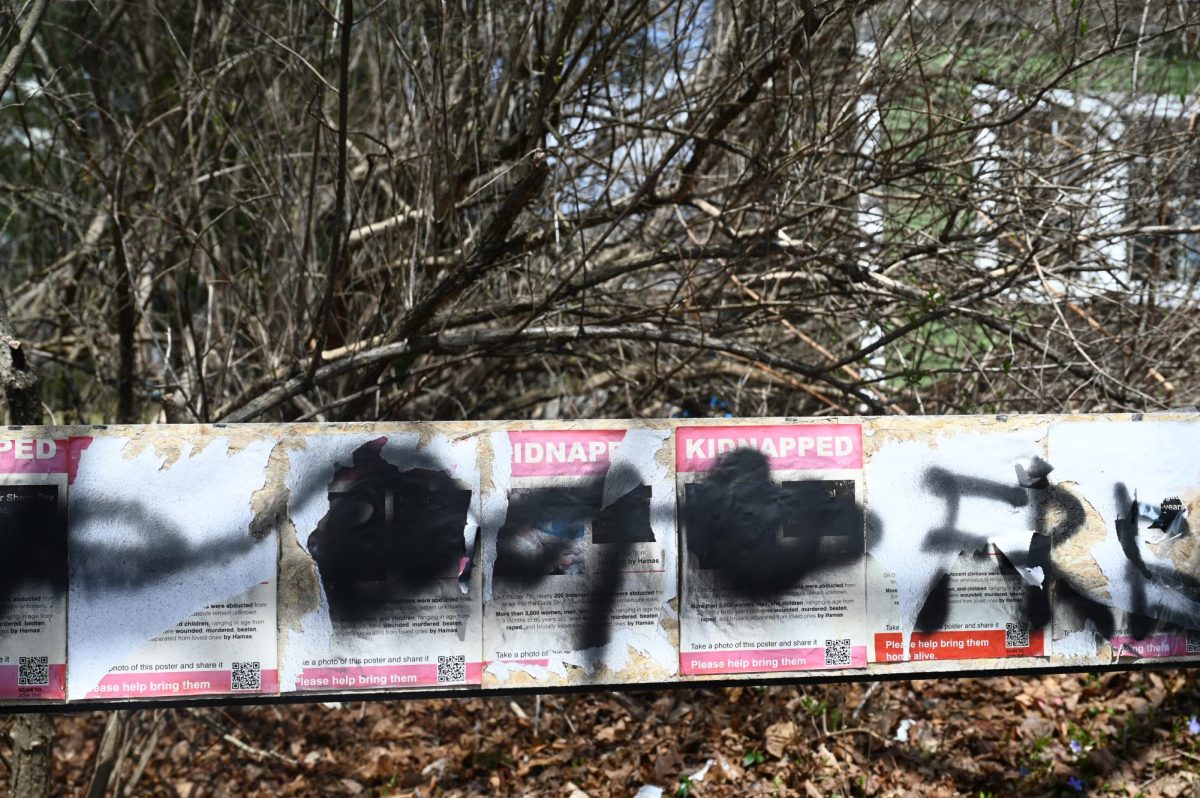On Oct. 27, Newton residents Jeffrey and Miriam Kosowsky put up a 100-foot-long wall of the 240 hostages taken captive by Hamas on Oct. 7. After months of remaining intact, their poignant tribute was vandalized last month in what authorities are currently investigating as a hate crime, said Kosowsky.
The vandals covered most of the hostagesŌĆÖ photos in black spray paint, while the rest were torn off the wall.┬Ā
On Sunday, April 7, at 12:30 p.m., the KosowskyŌĆÖs will host an event to rebuild the hostage wall. The initiative will be held in front of their home at 255 Homer St. The event is open to the public and no RSVP is required to attend.
Back in October, the KosowskyŌĆÖs set up the wall in front of their home because they live on a fairly busy street, Miriam said.
ŌĆ£We figured that it would be a good place to display it because people would see it and realize what is happening because people often have a short memory,ŌĆØ she said.
On Sunday morning, March 17, Miriam received a call from her neighbor notifying her that the wall had been destroyed.┬Ā
ŌĆ£We came outside, and were both so shocked it was that devastating,ŌĆØ she said. ŌĆ£[The vandals] had to stare into their eyes to wipe out their faces; they’re even looking at the eyes of the sweet little kids, and they don’t care.ŌĆØ┬Ā
Before the event on Sunday, students and children are invited to sign up to participate in unveiling a picture of one of the 130 hostages still held in Gaza.
ŌĆ£The child or student will say the hostage’s name and then a little bit about the hostage,ŌĆØ Miriam said. ŌĆ£We want to make people remember that the hostages are all human beings, and not see them as just names or part of a whole group but rather see them as a person who has a family and friends.ŌĆØ┬Ā
The event will feature guest speakers, music, and pastries from local kosher bakeries, such as Cheryl AnnŌĆÖs and BlackerŌĆÖs.┬Ā
Since Oct. 7, antisemitism has increased by 388 percent, according to the Anti-Defamation League Director and CEO Jonathan Greenblatt. Due to this, events like SundayŌĆÖs require extensive security, Miriam said.
ŌĆ£Unfortunately, we have a lot of haters and will have security and police who are going to be there, just to make sure that people are safe,ŌĆØ she said.
The rededication of the hostage wall will hopefully inspire families to engage in the Adopt a Hostage Family Campaign, Miriam said. This initiative was created to foster connections between advocates and the captives held in Gaza. ŌĆ£AdopteesŌĆØ of a hostage may leave an empty chair at their Shabbat table with a photo of their hostage, add a blue ribbon symbol with the name of their hostage to their synagogueŌĆÖs website, put up posters of their adopted hostage around their city, email their local congress member asking them to leverage their power to release the hostages, and more.┬Ā
In addition, the KosowskyŌĆÖs will arrange a table with stationery note cards where attendees can write a message to the hostageŌĆÖs families, which will then be distributed by the Israeli Consulate.┬Ā
ŌĆ£We bought markers, tons of heart stickers, and shiny, sparkly stickers to accompany sweet little notes from the kids,ŌĆØ Miriam said.┬Ā
By letter writing, unveiling, and learning about an individual hostage, the child or student can develop a personal connection to that person, Miriam said.
The KosowskyŌĆÖs emphasized ensuring the hostages remain at the forefront of peopleŌĆÖs minds.
ŌĆ£I think itŌĆÖs very important to acknowledge that we can’t say we’re feeling the hostageŌĆÖs familiesŌĆÖ pain, but that we’re thinking of them and praying for everybody to come home safely,ŌĆØ Miriam said.
